A Team On Target — Vermonters Rule In Biathlon
Last year, U.S. Biathlon team members Lowell Bailey and Susan Dunklee became the first two Americans to qualify for the Olympics, becoming favorites to earn a medal.
Update: On Jan. 11, US Biathlon officially named Morrisville’s Emily Dreissigacker to the U.S. Olympic Team, along with Joanne Reid (Boulder, Colo.) and Maddie Phaneuf (Old Forge, N.Y.).
While a majority of the U.S. ski and snowboard teams won’t know who is headed for the Olympics until the third week in January (when the official teams are announced), two biathletes with Vermont ties have known for almost a year. University of Vermont grad Lowell Bailey and Barton’s Susan Dunklee were the first Americans to qualify in any sport, having earned podium spots at the Biathlon World Championships in winter 2017.
As of early January, three of five spots on the men’s Olympic team have been decided (Bailey, Tim Burke and Sean Doherty) and two of the five women’s sports (Dunklee and Maine’s Clare Egan) secured via top 30 World Cup finishes.
As for the last three spots on the women’s team? Two Vermonters stand a very good chance at qualifying. In December, both Emily Dreissigacker of Craftsbury and Chloe Levins of Rutland were named to the IBU World Cup team, the last stage of qualifying for the Olympics. The two Vermonters will be competing against Maddie Phaneuf of Old Forge, N.Y. and Joanne Reid of Boulder.
Emily Dreissigacker, 29, has Olympic blood running through her veins. Both of her parents, Dick Dreissigacker and Judy Geer, competed in the Olympics as rowers, before going on to found Concept2, the rowing and erg company, and to build up the Craftsbury Outdoor Center. Emily’s aunt, Charlotte Geer, won a silver medal in rowing at the 1984 Olympics and her older sister, Hannah, competed in 2014 at Sochi as a biathlete.
Emily grew up skiing at Craftsbury, her home turf, in the winter and rowing in the summer. At 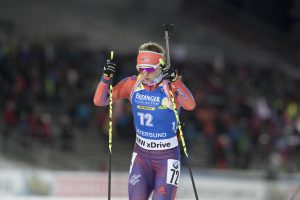 Dartmouth, she was a two-time All-American rower but after college decided to switch her focus to skiing and became hooked on biathlon.
Dartmouth, she was a two-time All-American rower but after college decided to switch her focus to skiing and became hooked on biathlon.
This December, Dreissigacker was the third American in the third IBU World Cup event, a 7.5 km sprint in Annecy, France. If she can keep that up at January’s next two IBU World Cups, she’s likely to earn a spot.
Rutland’s Chloe Levins, at 19 the youngest on the team, has also moved up the rankings. In December, the Middlebury College sophomore put in a fierce performance in the IBU Cup trials in Minnesota, winning the 12 km mass start event, her first win as a senior, and earning a second in the 7.5 km sprint. Levins also comes from an a family of athletes: her father raced alpine for Middlebury College and her mother, an All-American golfer at Duke, played on the LPGA tour.
In 2014, at age 14, Levins placed second of all women (not just juniors) at the Vermont State Amateur Golf Championship. Biathlon, which mixes the precision that golf requires, with the speed and aerobic conditioning cross-country skiing demands, seems perfect for Levins. And in the 2016 Youth Olympic Games, Levins placed fourth in biathlon, after starting in 22nd place and passing 18 competitors.
We expect to see both of them join Bailey and Dunkel in Korea.
THE CONTENDERS
Susan Dunklee, Barton, VT
On February 19, 2017, Susan Dunklee of Barton, Vermont stood on the starting line for finals of the Biathlon World Championships in Austria’s Pillersee Valley. The snowy Ötztal Alps towered above her and 30 other women. At the time, the Craftsbury skier was ranked 15th in the World Cup standings.
The gun popped and the women exploded from the mass start, pushing their skis in undulating V’s up the first hill of the 12.5-km loop. With Dunklee in 11th, the women pulled up to the first of four shooting stages.
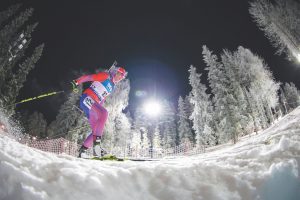 That’s when the unexpected happened: Dunklee fired five clean shots and pulled away, scurrying past women in the lead who were still lying belly-down to finish shooting. “Look who’s leading,” a commentator said as Dunklee pulled four seconds ahead. “It’s Susan Dunklee. Can she possibly, possibly do it for the United States—get their first-ever title at these World Championships?”
That’s when the unexpected happened: Dunklee fired five clean shots and pulled away, scurrying past women in the lead who were still lying belly-down to finish shooting. “Look who’s leading,” a commentator said as Dunklee pulled four seconds ahead. “It’s Susan Dunklee. Can she possibly, possibly do it for the United States—get their first-ever title at these World Championships?”
Dunklee, 31, didn’t miss a shot from beginning to end, arriving and leaving first from each of the four shooting stages. “I think we’re going to see a rise in American biathlon in the next decade,” the announcer said. He was right.
Lowell Bailey, from Lake Placid, N.Y., had already won gold at the same World Championship in the individual event. Dunklee fired off the final targets without missing a beat, heading for the finish line with a five-second lead.
Exhausted at the final climb, Dunklee allowed Germany’s Laura Dahlmeier, the 2016 silver medalist, to overtake her. She crossed the finish line at 42:53, two seconds behind Dahlmeier, with her arms raised in exaltation. She was the first American woman to medal at Worlds, and in that moment, she knew she was headed to PyeongChang.
It’s not the first time Dunklee has made a ground-breaking performance. At the 2012 Worlds in Ruhpolding, Germany, she placed fifth in the individual race, matching the best result ever by a U.S. woman. In the 2016-17 World Cup season, her most successful yet, she finished in the top ten in ten events.
Biathlon is the only Olympic sport in which an American athlete has yet to stand on a podium, but this February, Dunklee (and Bailey) could change that.
Dunklee’s strong season—not to mention the lack of competition from Russia after a state-backed doping program was exposed—has positioned her favorably. NBC has her on their roster of ‘Athletes to watch at the 2018 PyeongChang Winter Olympic Games.’
So what has made Dunklee so good? It could be genetic. Her father, Stan Dunklee, raced cross-country alongside Bill Koch in the 1976 Olympics, and again in 1980. Her uncle, Everett Dunklee, raced cross-country in the 1972 Olympics.
Born in tiny Barton, Vt., where her parents run Barton Veterinary Hospital, Dunklee was raised about a 30-minute drive from Craftsbury Outdoor Center. Her parents had met while racing on the University of Vermont cross-country team and Craftsbury was her playground.
“From the time she could walk, she was skiing a cross-country loop around the backyard here,” her father Stan said. “She would have been about two years old. When we gave her brother some skis for Christmas, she grabbed his old skis and put them on.” Dunklee started racing in the Bill Koch Youth Ski League ‘lollipop’ division when she was 5. “By age 8, I knew my way around every trail at Craftsbury and most of the alpine trails at Jay and Burke as well,” she recalls.
According to her father, Susan succeeds because of her ‘race head.’
“Her ability to zone in—some people have that, some people don’t, and she was blessed with it,” he says. “There are very few people I can say that about, and I’ve met a lot of athletes over the years.”
And that’s one of the main things Susan is focusing on as she trains for the Games. “My goal is to go into PyeongChang feeling ready. When the start gun goes off I shift into fight or flight mode,” she says. “I’m not entirely sure how it works, but I can dig deeper in a race than I ever could during training, no matter how hard I try,” she says.
She adds: “However, I do think you can do a lot to prepare for high pressure situations. I try to keep my focus on what I need to do to perform well. I create a race plan ahead of time with simple, doable keys about what to focus on at each point during the race. My job is not to be Superwoman out there; my job is to stick to my plan. If I follow that plan, then I know I performed well, no matter what the result sheet says.”
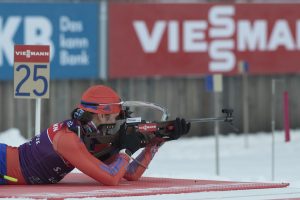 Biathlon, in particular, is a sport that requires control. In the 12.5 km mass start, athletes transition from skiing, when they need speed and which raises their heart rate, to shooting, where motions need to be precise. Transitions are made throughout the course as skiers stop at four shooting stages. At each stage, they must hit five targets in a row, taking a 150-meter (490-foot) penalty lap for each target they miss. To go from full exertion to full concentration is one of the unique challenges that biathletes have to master.
Biathlon, in particular, is a sport that requires control. In the 12.5 km mass start, athletes transition from skiing, when they need speed and which raises their heart rate, to shooting, where motions need to be precise. Transitions are made throughout the course as skiers stop at four shooting stages. At each stage, they must hit five targets in a row, taking a 150-meter (490-foot) penalty lap for each target they miss. To go from full exertion to full concentration is one of the unique challenges that biathletes have to master.
“I use my heart rate monitor to make sure my physical exertion level during a workout matches what my coaches prescribed on my training plan,” Dunklee says. “My max heart rate is just over 180 beats a minute. During a race my heart is beating almost three times a second as I am trying to shoot. So I focus on my breathing and shoot during the stillness between breaths.”
In addition to her control, Dunklee is driven. In high school, she ran competitively for St. Johnsbury Academy and quickly rose to the top of her class in academics.
“She was so disciplined,” Stan says. “Training started early, so she was at school by 7:30 a.m. or so. Sports practice started at 3:15, and she wouldn’t get home until 6 pm, and then she’d go upstairs and study until midnight.”
Dunklee was recruited to Dartmouth for running, but changed her mind and joined the cross-country ski team. She graduated without ever shooting a gun, but then she got a call from the U.S. Biathlon Association inviting her to join their development team in Lake Placid. At 22, she fired her first rifle.
“My first time on the shooting range was a warm May morning at Mount Van Hoevenberg in Lake Placid,” Dunklee says. “I distinctly remember noticing the smell of gunpowder after taking my first shot—it was not a smell that I’d ever associated with cross-country ski training and it seemed out of place. Now I don’t even notice it.”
Stan says he stepped back from being Dunklee’s coach, knowing early on that it might strain his relationship with her. But he snuck her tidbits of advice when he knew she was willing to listen, and served as inspiration as her career took off.
“The Olympics were certainly a dream of mine from a young age, and having an Olympian role model to look up to in the family helped that dream seem more attainable,” Susan said. “The best advice I’ve ever received came from my dad: ‘Remember to keep it fun!’”
“She’s a better athlete than I ever was, by the way,” Stan says. “I’ve learned never to underestimate her.”
Lowell Bailey, UVM Grad
Last February, University of Vermont graduate Lowell Bailey took gold at the Biathlon World Championships in Austria, winning the men’s individual competition by a 3.3 second margin. At age 35, he become the first American biathlete to ever medal at Worlds. That win also made him the first American in any sport to qualify for the 2018 Winter Olympic Games.
“Three-point-three seconds,” Bailey wrote on his blog the next day. “That was the margin when I toed the line. That was the margin of victory. And that is a number I will remember for the rest of my life.”
In 2016, just a year before he won Worlds, Bailey had planned to retire. His wife, Erika, was pregnant, 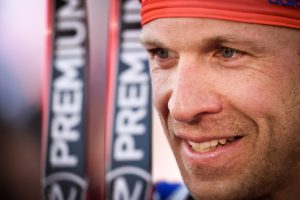 and after the World Cup circuit, he wanted to return home to upstate New York and pick up farming with her family. The multi-talented, four-time Olympian would have also pursued a side-gig as a musician—he plays guitar, mandolin, sings and writes songs, and has performed with multiple bands in the area.
and after the World Cup circuit, he wanted to return home to upstate New York and pick up farming with her family. The multi-talented, four-time Olympian would have also pursued a side-gig as a musician—he plays guitar, mandolin, sings and writes songs, and has performed with multiple bands in the area.
But then he received a call from what he calls a “fledgling non-profit” seeking to build a world-class biathlon training center on the West Coast. They asked him to continue competing through the 2018 Olympics while fundraising for their project on the side. With his wife’s encouragement, he accepted the job and fundraised while still competing.
No American has ever won an Olympic medal in biathlon, and Bailey is poised to be the first. This past summer, Bailey managed to raise his prone shooting average from 94 to 95 percent and his standing average from 79 to 85 percent. (Biathletes are required to shoot both standing and prone, and missing a shot entails either a time penalty or an extra lap of skiing).
And recently, he had another win. Bailey (along with Susan Dunklee) was one of many athletes calling on the International Olympic Committee to ban Russia from the Olympics after a state-run doping program was exposed. In November, two more Russian biathletes were banned for life by the IOC.
“When you put your entire life’s work into something under the assumption that you are operating by the same rules as everyone else on that field of play, and when you find out, no, that’s not the case, there’s a mix of anger, frustration, sadness,” Bailey told USA Today.
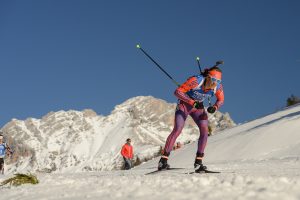
During the 2014 Winter Games in Sochi, Bailey clinched the best-ever Olympic finish by an American, falling short of a medal by a single missed shot. This year, with Bailey’s World Championships gold and fellow biathlete Susan Dunklee’s silver medal finish at the same event, the two are pushing the U.S. Biathlon team to an all-time high.
Bailey has been a biathlete for most of his life. He started cross-country skiing at the age of four, and by 12, he was “skiing through the woods and shooting at stuff.” Growing up with the Lake Placid Olympic Center in his backyard, Bailey tried every Olympic sport he could—ski jumping, Nordic combined, alpine skiing, and luge—before settling on biathlon
At UVM, Bailey competed on the Catamount NCAA Nordic Ski Team while competing for the U.S. Biathlon Team, until he realized that maintaining an elite status in both sports was impossible. He gave up his spot on the U.S. Biathlon Team, and went on to become a three-time NCAA Academic All-American as a Catamount. He returned to biathlon in 2005, after graduating.
For many years, Bailey and fellow Adirondack skier Tim Burke would drive — or ride their bikes — from Lake Placid to the Ethan Allen Training Center in Jericho, Vt. to train year-round (on skis or roller skis) on the biathlon course.
During the past year, he traveled the world to competing—with his wife and baby daughter in tow. “I feel so fortunate to have Erika supporting to me, and now with Ophelia—it’s a grounding presence,” he said after the Worlds. “No matter how you do in a biathlon race, when you come home, and you have a family, and you love them and they love you, that’s all you need.”
Photos courtesy of Photo courtesy of Manzoni/NordicFocus, taken at the 2017 IBU World Championships in Sweden.

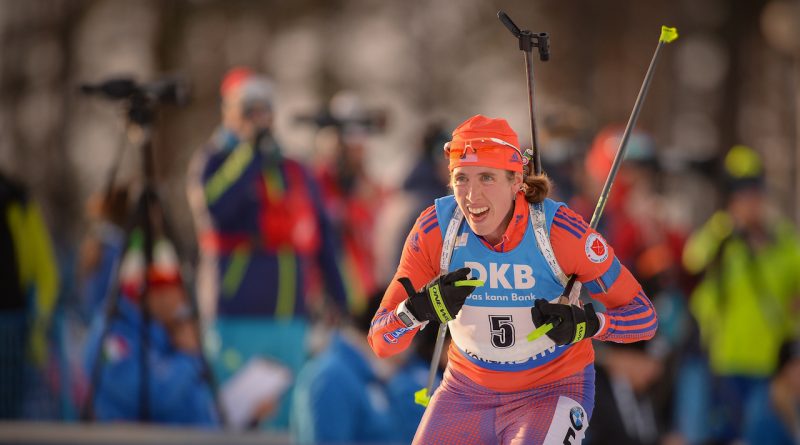
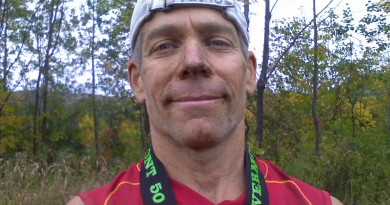
Pingback: You Olympic News, All In One Place — VT SKI + RIDE Magazine
Pingback: Vermonters Who've Made the Team - VT SKI + RIDE